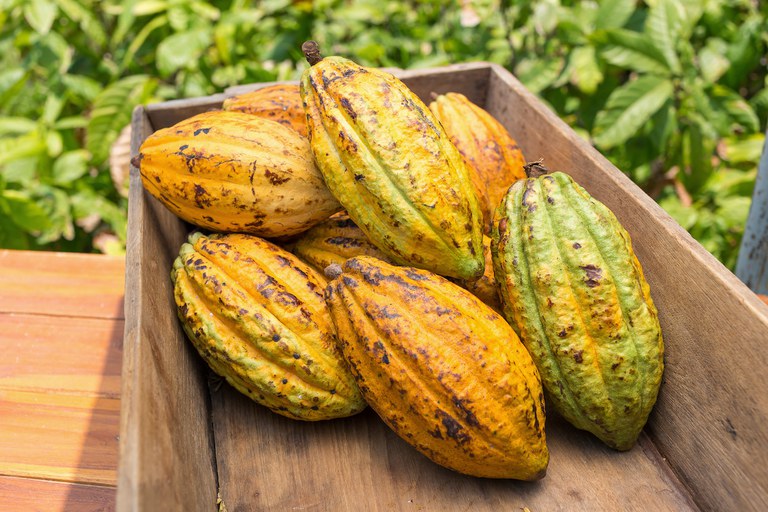Cacao provides an alternative to illicit production of coca for Colombian farmers
Problem
How can Colombian farmers make a sustainable living without growing illicit but profitable crops such as coca (the plant used to produce cocaine)?
- Fifty-three years of civil war have negatively impacted the agricultural investments and growth of Colombian farms.
- Disadvantaged farmers grew coca and marijuana either by force or because it was the only option during the conflict.
Findings
Plant scientists at Penn State are contributing their expertise on the genetics and the cultivation of the historical cacao plant to provide a road map for the post-conflict agricultural development of an alternative crop that is both profitable and sustainable. Cacao, the principal ingredient in chocolate, is native to Colombia, which already produces some of the finest-flavored cocoa in the world.
Impact
Cacao provides a new opportunity to support legal agricultural development in Colombia as the global demand for chocolate is continually increasing. The Cacao for Peace initiative provides training for the difficult-to-grow crop and seeks to make Colombia a major player in world cacao markets. By mapping the genetic diversity of cacao, the team will be able to trace early species of cacao to their origins and possibly identify the genes that are responsible for disease resistance.
Related Research Area: Advanced Agricultural and Food Systems
Research Credit
Team
Participating Departments
Partners
- USDA Foreign Agricultural Service, U.S. Agency for International Development, United Nations Office of Drugs and Crime, the Peace Corps, Corporación Colombiana de Investigación Agropecuaria (AGROSAVIA), the Colombian National Federation of Cocoa ( Fedecacao ), and Purdue University
Competitive Funding
- USDA Foreign Agricultural Service; U.S. Agency for International Development
Federal and State Appropriations
- USDA NIFA Hatch Multistate Project PEN04569, Accession #1003147
Emerging Discoveries
Published Research
Gene Expression Modularity Reveals Footprints of Polygenic Adaptation in Theobroma cacao
-
Hämälä, T., Guiltinan, M. J., Marden, J. H., Maximova, S. N., Depamphilis, C. W., & Tiffin, P. (2020). Gene Expression Modularity Reveals Footprints of Polygenic Adaptation in Theobroma cacao. Molecular biology and evolution, 37(1), 110-123. https://doi.org/10.1093/molbev/msz206
Widely distributed variation in tolerance to Phytophthora palmivora in four genetic groups of cacao
-
Fister, A. S., Leandro-Muñoz, M. E., Zhang, D., Marden, J. H., Tiffin, P., dePamphilis, C., Maximova, S., & Guiltinan, M. J. (2020). Widely distributed variation in tolerance to Phytophthora palmivora in four genetic groups of cacao. Tree Genetics and Genomes, 16(1), [1]. https://doi.org/10.1007/s11295-019-1396-8
Resistant and susceptible cacao genotypes exhibit defense gene polymorphism and unique early responses to Phytophthora megakarya inoculation
-
Pokou, D. N., Fister, A. S., Winters, N., Tahi, M., Klotioloma, C., Sebastian, A., Marden, J. H., Maximova, S. N., & Guiltinan, M. J. (2019). Resistant and susceptible cacao genotypes exhibit defense gene polymorphism and unique early responses to Phytophthora megakarya inoculation. Plant molecular biology, 99(4-5), 499-516. https://doi.org/10.1007/s11103-019-00832-y
Transient expression of CRISPR/Cas9 machinery targeting TcNPR3 enhances defense response in theobroma cacao
-
Fister, A. S., Landherr, L., Maximova, S. N., & Guiltinan, M. J. (2018). Transient expression of CRISPR/Cas9 machinery targeting TcNPR3 enhances defense response in theobroma cacao. Frontiers in Plant Science, 9, [268]. https://doi.org/10.3389/fpls.2018.00268
Emerging Discovery
Office for Research and Graduate Education
Address
217 Agricultural Administration BuildingUniversity Park, PA 16802-2600
- Email agresearch@psu.edu
- Office 814-865-3136
Emerging Discovery
Office for Research and Graduate Education
Address
217 Agricultural Administration BuildingUniversity Park, PA 16802-2600
- Email agresearch@psu.edu
- Office 814-865-3136





